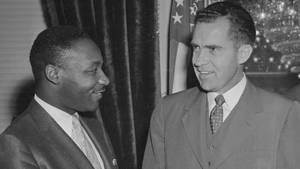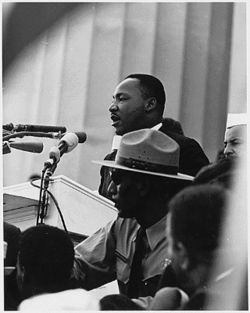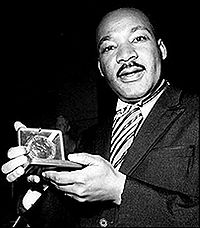Martin Luther King

Reverend Martin Luther King, Jr., Ph.D. (1929–1968) was by far the most important black leader of the 1960s. He was an advocate of civil rights in America, who was assassinated in 1968. King was the son of a Baptist minister and became a Baptist minister himself.[1]
King had a personal friendship with then-Vice President Richard Nixon which helped propel King into a prominent role in the civil rights movement and the national spotlight.
Contents
Civil rights
On Dec. 31, 1955, he led the nonviolent boycott of city buses of Montgomery, Alabama, after Rosa Parks was arrested for not moving to the back of the bus.[2]
Vice President Richard Nixon invited King to Washington, D.C., for a meeting on 13 June 1957. This meeting, described by Bayard Rustin as a “summit conference,” marked national recognition of King's role in the civil rights movement (Rustin, 13 June 1957). Seeking support for a voter registration initiative in the South, King appealed to Nixon to urge Republicans in Congress to pass the 1957 Civil Rights Act and to visit the South to express support for civil rights. Optimistic about Nixon's commitment to improving race relations in the United States, King told Nixon, “How deeply grateful all people of goodwill are to you for your assiduous labor and dauntless courage in seeking to make the civil rights bill a reality.” Sen. John Kennedy voted against the 1957 Civil Rights Act, which created the Justice Department's Civil Rights Division.
Rev. King wrote his most famous writing, “Letter From A Birmingham Jail” (1963), while imprisoned for demonstrating against segregated eating facilities.
| “ | Darkness cannot drive out darkness; only light can do that. Hate cannot drive out hate; only love can do that. | ” |
King founded the Southern Christian Leadership Conference.
Rev. King's most famous speech, delivered to a huge crowd gathered in Washington, D.C. in 1963, chanted the refrain "I Have a Dream" of an end to segregation and discrimination. It was a brilliant Christian sermon that drew upon verses and images in the Bible,[3] ending in "Thank God Almighty, we are free at last!"[4] In 1964, Rev. King was awarded the Nobel Peace Prize. Rev. King was assassinated by James Earl Ray on April 4, 1968 in Memphis, Tennessee.
On April 16, 1963, Rev. King wrote:
- "As the Apostle Paul carried the gospel of Jesus Christ ... so am I compelled to carry the gospel... I must make two honest confessions to you, my Christian and Jewish brothers ...
- I stand in the middle of two opposing forces ... One is a force of complacency ... The other force is one of bitterness and hatred, and it comes perilously close to advocating violence. It is expressed in the various black nationalist groups ... the largest being Elijah Muhammad's Muslim movement.
- Nourished by frustration over racial discrimination, this movement is made up of people who have lost faith in America ...
- I have tried to stand between these two forces ... for there is the more excellent way of love ...
- One day the South will know that when these disinherited children of God sat down at lunch counters they were standing up for what is best in the American dream and for the most sacred values in our Judeo-Christian heritage."
In his 1964 book, WHY WE CAN'T WAIT, Rev. King wrote:
- "Whenever this issue of compensatory or preferential treatment for the Negro is raised, some of our friends recoil in horror. The Negro should be granted equality, they agree, but he should ask for nothing more. On the surface, this appears reasonable, but it is not realistic. For it is obvious that if a man enters the starting line of a race three hundred years after another man, the first would have to perform some incredible feat in order to catch up."
His last major public speech became known as "I've Been to the Mountaintop" [5]
King supported the existence of the Jewish State Israel.[6]
Education and plagiarizing accusations
King was educated at Boston University, where he earned his advanced degree in theology. Years later, a committee of scholars appointed by the university concluded that some passages in his PhD dissertation had been plagiarized,[7] A book about the plagiarism was published by Pappas.[8] According to Ron Grossman, a Chicago Tribune staff writer:
- In 1990, rumors went around the professorial cocktail-party circuit that scholars preparing an edition of Martin Luther King Jr.'s papers had come across disturbing instances of plagiarism. Pappas got hold of King's doctoral thesis in theology and that of a certain Jack Boozer, who had preceded King as a graduate student at Boston University, laid them side by side and discovered that, indeed, King had cribbed whole sections. [1]
Nobel Peace Prize laureate
On December 10, 1964, in Oslo, Norway, Martin Luther King Jr. was awarded with the Nobel Peace Prize. His acceptance speech started saying:
| “ | I accept the Nobel Prize for Peace at a moment when twenty-two million Negroes of the United States of America are engaged in a creative battle to end the long night of racial injustice. I accept this award in behalf of a civil rights movement which is moving with determination and a majestic scorn for risk and danger to establish a reign of freedom and a rule of justice... I accept this award today with an abiding faith in America and an audacious faith in the future of mankind. I refuse to accept despair as the final response to the ambiguities of history. I refuse to accept the idea that the "isness" of man's present nature makes him morally incapable of reaching up for the eternal "oughtness" that forever confronts him. [2] | ” |
Foreign policy
By 1966 his attacks on the Vietnam War led to a break with Lyndon Johnson and the labor unions that had been his base of support in the white community (along with the liberal churches).
"I Have A Dream"
Dr. King's monumental speech at a huge gathering in Washington, D.C., electrified the nation. Many people who had not previously considered equal rights for blacks to be an important issue were impressed with the many points he made in his speech about racial discrimination. His eloquent theme of "Let freedom ring" (reminiscent of Archibald Carey's 1951 sermon)[9] likewise motivated many Americans, particularly white Judeo-Christians, to take up the cause of integration.
Political affiliation
Martin Luther King Jr. professed no political affiliation.
SOURCE:
King Institute Standford University
King Papers
https://kinginstitute.stanford.edu/king-papers/documents/interview-bennett-college
Interview at Bennett College.
Author: King, Martin Luther, Jr. Date: February 11, 1958
Location: Greensboro, N.C. Genre: Interview
QUOTE:-
“I don't think the Republican party is a party full of the almighty God nor is the Democratic party. They both have weaknesses … And I'm not inextricably bound to either party.”-MLK JR
Theology
Rathbun (1968) shows the theological basis for King as a social reformer derived from four sources: the Social Gospel of Walter Rauschenbusch, the Protestant Neo-Orthodoxy of Reinhold Niebuhr and Paul Tillich, Personalism taught at Boston University, and Gandhi's concept of nonviolent love. King's synthesis of these four sources supported his civil rights activities. Laws may be broken, said King, if they are unjust laws which do not conform to eternal, natural law. Jesus, said King, was a true revolutionary who brought peace as a "presence of justice" instead of an "absence of tension." The church also must be revolutionary to counteract evil and bring about social justice. King's theology of social action foresaw complete, unprejudiced equality based on natural rights and privileges.[10]
According to his doctoral papers, King denied several key Christian doctrines, including Christ's omniscience, the "orthodox view of the divinity of Christ," and his birth of a virgin, among other doctrines.[11]
Assassination
On April 3, 1968, King attended a rally in Memphis, Tennessee in support of local black sanitation workers who were striking due to a wage imbalance with white colleagues. The following evening, he was standing on the balcony outside his room at the Lorraine Motel when a shot rang out. King was hit in the face and rushed to a nearby hospital where he was pronounced dead at 7:05 p.m. He was 39 years old.[12]
News of King's death spread quickly and sparked riots in 100 U.S. cities. President Lyndon Johnson pleaded with Americans to refrain from violent demonstrations, saying "I ask every citizen to reject the blind violence that has taken Dr King." Presidential candidate Robert Kennedy was also vocal in pleading for peace.[13]
King's assassin, a white ex-convict named James Earl Ray, successfully eluded police for two months. He fled to Canada, where he lived under the alias Ramon George Sneyd. He was arrested on June 8, 1968 and confessed to the crime, for which he received a sentence of 99 years in prison.[14]
Although King is generally embraced by the American cultural establishment today, he and the authorities did not always have such a cordial relationship. In 1967, King called the United States "the greatest purveyor of violence in the world today." The FBI, under the direction of J. Edgar Hoover, kept King under surveillance from 1961 until his death in 1968. The Bureau tapped his phones and bugged his hotel rooms. The FBI did not end its surveillance of King's wife, Coretta Scott King, until many years after her husband's death.
Because of this, and despite Ray's confession to the murder, both Jesse Jackson and King's son Dexter Scott King have both said there was a government conspiracy to murder the civil rights leader. Jackson wrote the foreword to Ray's autobiography Who Killed Martin Luther King Jr.? and in it, he wrote "I have always believed that the government was part of a conspiracy, either directly or indirectly, to assassinate Dr. Martin Luther King Jr."[15]
Memorial
On Oct. 16, 2011, a memorial to the Rev. Dr. Martin Luther King Jr. — the first honoring an African-American in the area of the Mall — was dedicated in Washington. The memorial — a four-acre tract along the Tidal Basin that is dotted with elms and cherry trees and anchored by an imposing granite statue of Dr. King — is the product of more than two decades of work. It was conceived in 1983 by members of Dr. King's fraternity, Alpha Phi Alpha, and authorized by Congress in 1996.
The monument to Dr. Martin Luther King Jr. is not only the first to a black man on the Mall and its adjoining parks, but also the first to honor a person who was not a president. His stone figure faces the Jefferson Memorial across the water. Lincoln is at his back, and Roosevelt to his right. [3]
The monument was built in China. The inaccurate inscription on the monument attributed to MLK Jr. was removed in August 2013. In addition, MLK Jr's likeness, one of folded arms in resistance, does not accurately portray the man.
Quotes
- "We know from painful experience that freedom is never voluntarily given by the oppressor. It must be demanded by the oppressed." [16]
- "Judge people by the content of their character not the color of their skin."
- "Faith is taking the first step even when you don't see the whole staircase."
- "I submit that an individual who breaks a law that conscience tells him is unjust, and who willingly accepts the penalty of imprisonment in order to arouse the conscience of the community over its injustice, is in reality expressing the highest respect for the law.
- "It may be true that the law cannot make a man love me, but it can stop him from lynching me, and I think that's pretty important."
- "We must learn to live together as brothers or perish together as fools."
- "When you are right you cannot be too radical; when you are wrong, you cannot be too conservative."
- "Injustice anywhere is a threat to justice everywhere."
- "I submit to you that if a man hasn't discovered something he will die for, he isn't fit to live."
- "Nothing in all the world is more dangerous than sincere ignorance and conscientious stupidity."
- "Like a boil that can never be cured so long as it is covered up but must be opened with all its ugliness to the natural medicines of air and light, injustice must be exposed, with all the tension its exposure creates, to the light of human conscience and the air of national opinion before it can be cured."
- "A nation or civilization that continues to produce soft-minded men purchases its own spiritual death on the installment plan."
See also
- Gallery of American Heroes
- Martin Luther King, Jr. Day
- Black Americans, history and religion
- Malcolm X
- Black history
- Essay:List of celebrities who support the Second Amendment
- Morris Taft Thomas
Further reading
- King Online Encyclopedia, 1000+ articles by scholars
- Online books and articles on King
- Plagiarism and the Cultural War
- Review of The Martin Luther King. Jr., Plagiarism Story - T.E. Wilder
- Critical view of King, due to his alleged Communist leanings
- Where Are You, Martin Luther King?. PragerU.
- His Dream is Now Our Dream
References
- ↑ King became the pastor of the Ebenezer Baptist Church in Atlanta, Georgia.
- ↑ Chronology of Dr. Martin Luther King, Jr. (archive, WayBack machine)
- ↑ For example, the speech recited Isaiah 40:4-5.
- ↑ http://www.americanrhetoric.com/speeches/mlkihaveadream.htm
- ↑ http://www.afscme.org/about/1549.cfm
- ↑ http://www.zcommunications.org/fraud-fit-for-a-king-israel-zionism-and-the-misuse-of-mlk-by-tim-wise
- ↑ Boston U. Panel Finds Plagiarism by Dr. King but perhaps not deliberately. - October 11, 1991
- ↑ The Martin Luther King Plagiarism Story
- ↑ Four Things About King Snopes
- ↑ John W. Rathbun, "Martin Luther King: The Theology of Social Action." American Quarterly 1968 20(1): 38-53. in JSTOR
- ↑ Kirkwood, R. Cort (January 21, 2019). Was Martin Luther King, Jr. Even a Christian? His Doctoral Papers Say No. The New American. Retrieved January 21, 2019.
- ↑ http://history1900s.about.com/cs/martinlutherking/a/mlkassass_2.htm
- ↑ http://news.bbc.co.uk/onthisday/hi/dates/stories/april/4/newsid_2453000/2453987.stm
- ↑ http://www.fullissue.com/index.php/james-earl-ray-biography-1929-1998.html
- ↑ http://www.trutv.com/library/crime/terrorists_spies/assassins/ray/1.html
- ↑ God's new Israel: religious interpretations of American destiny - Page 346 by Conrad Cherry
| ||||||||||||||


